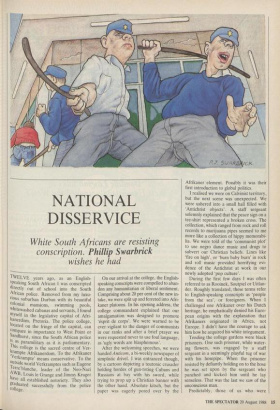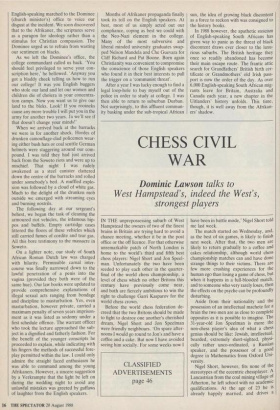NATIONAL DISSERVICE
White South Africans are resisting
conscription. Phillip Swarbrick
wishes he had
TWELVE years ago, as an English- speaking South African I was conscripted directly out of school into the South African police. Removed from my luxu- rious suburban Durban with its beautiful colonial mansions, swimming pools, whitewashed cabanas and servants, I found myself in the legislative capital of Afri- kanerdom, Pretoria. The police college, located on the fringe of the capital, can Compare in importance to West Point or Sandhurst, since the South African police is as paramilitary as it is parliamentary. This college is the sacred centre of Ver- krampte Afrikanerdom. To the Afrikaner Verkrampte' means conservative. To the outside world Verkramptes such as Eugene Terre'blanche, leader of the Neo-Nazi AWE, Louis le Grange and Jimmy Kruger have all established notoriety. They also graduated successfully from the police college. On our arrival at the college, the English- speaking conscripts were compelled to aban- don any humanitarian or liberal sentiment. Comprising about 20 per cent of the new in- take, we were split up and ferreted into Afri- kaner platoons. In his opening address, the college commandant explained that our amalgamation was designed to promote `esprit de corps'. We were warned to he ever vigilant to the danger of communists in our ranks and after a brief prayer we were requested never to use foul language, as 'ugly words are blasphemous'.
After the welcoming speeches, we were handed Anticom, a bi-weekly newspaper of simplistic drivel. I was entranced though, by a cartoon depicting a teutonic crusader holding hordes of gun-toting Cubans and Russians at bay with his sword, while trying to prop up a Christian banner with the other hand. Absolute kitsch, but the paper was eagerly pored over by the Afrikaner. element. Possibly it was their first introduction to global politics.
I realised we were on Calvinist territory, but the next scene was unexpected. We were ushered into a small hall filled with `Antichrist objects'. A staff sergeant solemnly explained that the peace sign on a tee-shirt represented a broken cross. The collection, which ranged from rock and roll records to marijuana pipes seemed to me more like a collection of hippy memorabi- lia. We were told of the 'communist plot' to use negro dance music and drugs to subvert our Christian beliefs. Lines like `fire on high', or 'burn baby burn' in rock and roll music provided horrifying evi- dence of the Antichrist at work in our newly adopted 'pop culture'.
During the first few days I was often referred to as Rooinek, Soutpiel or Uitlan- der. Roughly translated, these terms refer to English-speaking conscripts as 'people from the sea', or foreigners. When I challenged one Afrikaner over his Dutch heritage, he emphatically denied his Euro- pean origins with the explanation that Afrikaners originated in Africa, not Europe. I didn't have the courage to ask him how he acquired his white integument.
Tending the college gardens were black prisoners. One such prisoner, while water- ing flowers, was engaged by a staff sergeant in a seemingly playful tug of war with his hosepipe. When the prisoner resisted by defiantly holding on to the hose he was set upon by the sergeant who punched and kicked him until he lay senseless. That was the last we saw of the unconscious man.
Predictably, those of us who were English-speaking marched to the Dominee (church minister's) office to voice our disgust at the incident. We soon discovered that to the Afrikaner, the scriptures serve as a paragon for ideology rather than a stimulus for Christian compassion. The Dominee urged us to refrain from wasting our sentiment on blacks.
As we left the Dominee's office, the college commandant called us back. 'You should feel privileged to serve your con- scription here,' he bellowed. 'Anyway you got a bladdy cheek telling us how to run our college! It was you English buggers who stole our land and let our women and children die of cholera in your concentra- tion camps. Now you want us to give our land to the bleks. Look! If you rooineks cause any more trouble I will put you in the army for another two years. Ja we'll see if that doesn't change your minds!'
When we arrived back at the barracks we were in for another shock. Hordes of drunken camouflage-clad policemen wear- ing either bush hats or coal scuttle German helmets were staggering around our com- pound. I was told they had just arrived back from the Soweto riots and were up to mischief. That night I was rudely awakened as a steel canister clattered down the centre of the barracks and rolled under somebody's bed. A muffled explo- sion was followed by a cloud of white gas. Much to the delight of the drunken mob outside we emerged with streaming eyes and burning nostrils.
The following day at our sergeant's behest, we began the task of cleaning the armoured riot vehicles, the infamous hip- pos and buffets. Empty cartridge cases littered the floors of these vehicles which still carried fumes of cordite and tear gas. All this bore testimony to the massacre in Soweto.
On a lighter note, our study of South African Roman Dutch law was charged with hilarity. Permissible carnal inter- course was finally narrowed down to the lawful penetration of a penis into the vagina (provided they both were of the same hue). Our law books were updated to provide comprehensive explanations of illegal sexual acts ranging from bondage and discipline to masturbation. Yes, even masturbation, however private, carried a maximum penalty of seven years imprison- ment as it was listed as sodomy under a first schedule offence. The warrant officer who took the lecture approached the sub- ject in a dignified and fatherly fashion. For the benefit of the younger conscripts he proceeded to explain, while indicating with his fingers the methods of successful fore- play permitted within the law. I could only admire the straight faced enthusiasm he was able to command among the young. Afrikaners. However, a sincere suggestion by a Verkrampte that the light be left on during the wedding night to avoid any unlawful mistakes was greeted by guffaws of laughter from the English speakers. Months of Afrikaner propaganda finally took its toll on the English speakers. At best, most of us simply acted out our compliance, coping as best we could with the Neo-Nazi element in the college. Many of the most subversive and liberal minded university graduates swap- ped Nelson Mandela and Che Guevara for Cliff Richard and Pat Boone. Born again Christianity was convenient to compromise the conscience of those English speakers who found it in their best interests to pull the trigger on a 'communist threat'.
After a year I was lucky enough to find a legal loop-hole to buy myself out of the police in order to study at college. I was then able to return to suburban Durban. Not surprisingly, to this affluent commun- ity basking under the sub-tropical African sun, the idea of growing black discontent as a force to reckon with was consigned to the history books.
In 1988 however, the apathetic stoicism of English-speaking South Africans has given way to panic as the threat of black discontent draws ever closer to the luxu- rious suburbs. The British heritage they once so readily abandoned has become their main escape route. The frantic attic search for Grandfathers' British birth cer- tificate or Grandmothers' old Irish pass- port is now the order of the day. As over 6,000 English-speaking South African mig- rants leave for Britain, Australia and Canada each year, a new chapter in the Uitlanders' history unfolds. This time, though, it is well away from the Afrikan- ers' shadow.























































 Previous page
Previous page